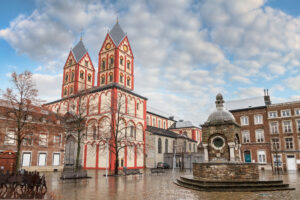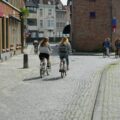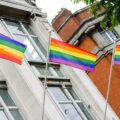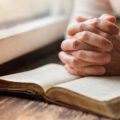The blurred lines between identity, religion, and education
The blurred lines between identity, religion, and education
Secular, Islamic, and Catholic bubbles are still very much present in Belgium. However, they are the source of conflict when it comes to the topic of religious identity in Belgian society.
This article is part of our series on normativity in Europe.
Bubbles of religious belonging in Belgium
Belgium once had a very Catholic identity, enforced by the clergy through education. Since the Enlightenment, however, the approach to education became increasingly secular and the population of Catholics began to dwindle.[1] For example, expressing religious identity in Belgian municipal schools became a subject of debate when the question of wearing hijabs was raised in 2020. In September 2021, the ban on religious symbols, including the hijab, in the Belgian Francophone region of Wallonia was lifted after petitions by activists.[2] In a way, secularisation efforts in municipal schools and universities attempted to cross Islamic boundaries or ‘bubbles’ by banning head coverings for Muslim women.[3]
Aside from the secular and Islamic bubbles, the Catholic bubble still remains a cultural force, particularly in educational institutions run by the Catholic Church and other affiliated communities and organisations. Such examples of these affiliated groups involved in Belgian society are Caritas,[4] the Jesuit Refugee Service,[5] and the International Catholic Migration Commission.[6] These bubbles of belonging are points of contention when it comes to discourse regarding religious identity and Belgian society.
The place of Catholicism in Belgian academia
It has been argued by some religious groups that the decline in catechetical or religious instruction resulted in a downturn in the knowledge of doctrine among young people who belong to their religious denominations. Bishop Bonny of Antwerp, however, questions the kind of fundamentals that need to be taught in Belgian religious education. For Bishop Bonny, the fundamentals of Catholic doctrine that need to be taught in schools are more than jargon, figures, or which Bible verse says what, but rather the ethical foundations upon which Catholicism is hinged upon.[7] The bishop added that while it is good that a young person knows the details of the story of the Good Samaritan, it is much more important that a young person knows how to treat other people with compassion and care.[8] Belgian Catholic education should keep a balance between teaching fundamental doctrines as well as the relational, moral concepts contained within it.
Commenting on the 2019 reform on the religious education curriculum, Lieven Boeve from the Catholic University of Leuven added that a philosophy of dialogue and openness to pluralism is needed in order for the religious sphere to permeate the secular bubble.[9] Bonny stressed, however, that there is a need for literacy regarding the fundamentals of Roman Catholicism, even while learning about other belief systems. The tension between maintaining literacy on the basic tenets of Catholicism and openness to other life philosophies still remains.[10]
Such was the case back in 2010 when Mieke Van Hecke, then-director general of the Flemish Secretariat of Catholic Education, discussed the issue of having just one subject on religion in Flemish municipal schools instead of having separate subjects on each religion, including Catholicism and Islam.[11] She disputed that one can only enter into dialogue with another religion when one is literate with one’s own religion. She insisted that one’s own religious identity should be established before engaging with other belief systems.[12] In maintaining that there should be separate subjects for each religion, Van Hecke seems to see each religion as some sort of ‘bubble’, communities or concepts with a clear set of boundaries and criteria for inclusion and exclusion.
The Catholic University of Leuven
It was also around this time that there were talks of dropping the ‘Catholic’ title of the University of Leuven. The Faculty of Theology and Religious Studies of the university issued a statement regarding these discussions back in December 2011. It insisted that regardless of the final name, the university will remain Catholic. The KU Leuven will also remain a canonical faculty. This is due to the separate agreements with the Vatican’s Congregation for Catholic Education and the Archdiocese of Mechelen-Brussels.[13] In the end, the university decided to keep the ‘Catholic’ in its name, albeit abbreviated to become the KU Leuven.[14]
It is interesting to see the definition of Catholic identity adopted by the KU Leuven’s Faculty of Theology. For them, Catholic identity fundamentally means openness to dialogue and inclusion.[15] The faculty took a maximalist perspective on Catholic identity in order to engage the secularist side in the university during the debates. This eventually worked.[16] The university managed to maintain its ‘Catholic’ title without compromising its ideals of openness to other views in Belgian society and academic freedom. Despite becoming autonomous from the Catholic hierarchy because of its funding by the state, the mission of the KU Leuven remains aligned with Christian ideals.[17] It describes a normativity of secularism with the Catholic Church remaining as a cultural and humanitarian influence. The Church’s influence could still be felt in the educational bubble, albeit in a more dialogical capacity with secular society.
The secular and religious bubbles have become very pronounced in the KU Leuven during this time of tension. These bubbles, however, are not mutually exclusive in the production of knowledge in Belgian society. The attempt to rename the prominent university has become an indicator of the efforts to assess, redefine, and rearticulate Catholic identity. The orientation to engage with the increasingly changing societal context in Belgium has become the thrust of Catholic institutions.
Plurality versus identity
Perhaps an orientation towards open dialogue and pluralism can be a point of intersection for these bubbles. Of course, resistance to dialogue would need to be addressed, and there will always be a tension between keeping one’s identity and facing a diverse reality. This diverse, pluralistic reality with various bubbles that Belgian society faces is a point of conflict, but conflicts can be resolved through openness and inclusive dialogue. These bubbles of education, Catholic identity, religious expression, and secularisation in Belgium seem to point to a normativity of critical discourse, the gradual acceptance of pluralism, and the need for dialogue.
Our team of analysts conducts research on topics relating to religion and society. In the second half of 2021, we are focusing on the subject of normativity. Find out more on the EARS Dashboard.
Sources
[1] Met uitsterven bedreigd: de Brusselse kerkganger
[2] Lifting of hijab ban in southern Belgium offers hope for Muslim women
[3] Belgian universities stress that they will not ban headscarves
[4] Caritas International Belgium: Assistance to victims of violence, natural disasters, and poverty
[5] Jesuit Refugee Service Belgium: JRS
[6] Welcome to ICMC – The International Catholic Migration Commission (ICMC)
[7] Bisschop Bonny over nieuw leerplan: ‘Godsdienst blijft een leervak’
[8] Ibid
[9] Ibid
[10] Ibid
[11] “We gaan katholieke godsdienstlessen bijsturen”
[12] Ibid
[13] The University of Leuven remains Catholic – Faculty of Theology and Religious Studies
[14] Leuven University changes its name
[15] The University of Leuven remains Catholic – Faculty of Theology and Religious Studies
[16] Ibid
[17] Catholic University of Leuven reaffirms Catholic identity






